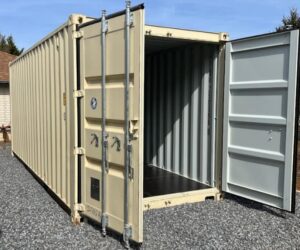Container Hotel Business Profitability and Startup Costs: Is It a Smart Investment?
Introduction to the Concept of Container Hotels
Container hotels are an innovative and rapidly growing trend in the hospitality industry, driven by the increasing demand for eco-friendly and sustainable accommodations. These hotels utilize shipping containers as the primary building element, creating unique and modular construction setups that are both cost-effective and adaptable to flexible layouts. This modern approach to hotel design not only reduces construction waste but also shortens the development timeline, allowing entrepreneurs to bring their businesses to market faster.
The visual appeal and unique design of container hotels resonate with travelers seeking customer experience centered around creativity and environmental consciousness. But beyond aesthetics, what is the actual profitability of a container hotel business, and how do startup costs play a crucial role in determining success?

Initial Investment and Startup Costs
One of the main reasons entrepreneurs are turning to container hotels is the relatively low initial investment and startup costs compared to traditional hotels. Building a conventional hotel can cost millions of dollars, while a container hotel can be established for significantly less.
Key factors in the initial investment and startup costs:
- Purchasing or location selection and leasing land
- Acquiring and customizing shipping containers
- Utility installation (water, electricity, sewage)
- Permits and licensing fees
- Customization costs and renovation expenses
- Startup costs such as equipment leasing and kitchen equipment if offering food services
Operating Costs and Maintenance
Operating costs for container hotels tend to be lower due to energy efficiency and reduced maintenance and repair needs. However, labor costs, waste disposal fees, and insurance premiums should also be factored into the overall budget.
Key operating expenses:
- Utilities and waste disposal fees
- Labor costs
- Maintenance and repair
- Insurance premiums
- Marketing expenses
Target Market, Customer Experience, and Occupancy Rates
Container hotels attract specific groups:
- Eco-friendly travelers seeking sustainability
- Adventurers and young tourists
- Digital nomads and budget-conscious visitors
Customer experience is enhanced by the unique design and flexible layouts of container hotels, leading to positive reviews and repeat visitors. High occupancy rates are achievable, particularly in tourist hotspots.
Room Rates, Revenue, and Return on Investment
Room rates in container hotels vary based on location selection and quality of services. In popular tourist areas, rates can range from $50 to $200 per night.
Example: A container hotel with 10 rooms, an occupancy rate of 80%, and an average rate of $100 per night can generate approximately $24,000 in monthly revenue.
Due to low initial investment and cost-effectiveness, return on investment can be achieved within 1 to 3 years, outperforming traditional hotel models.
Challenges, Risks, and Competitor Insights
Despite promising profitability, container hotels face certain challenges:
- Navigating permits and licensing fees
- Managing maintenance and repair for shipping container structures
- Dealing with seasonal fluctuations and occupancy rate variability
Additionally, businesses exploring restaurant shipping containers, small container restaurant design, and restaurant container kitchen design are also leveraging shipping containers for food ventures. These innovative dining concepts have demonstrated the potential for cost-effectiveness and energy efficiency, which can similarly benefit container hotels. Insights from shipping container restaurant cost and shipping container restaurant plans can offer valuable inspiration for container hotel owners. For instance, restaurant container sizes and kitchen equipment solutions can be adapted to optimize small spaces within container hotels. Furthermore, understanding profitable restaurant food cost percentage and food and beverage costs could be advantageous for hoteliers considering on-site dining options, enhancing overall profitability and customer experience.
Conclusion: Is Investing in a Container Hotel Worth It?
With detailed market research and proper planning, container hotel business profitability can be substantial. Lower initial investment, reduced operating costs, and high occupancy rates make this sustainable and eco-friendly business model an attractive opportunity in the hospitality sector. Factoring in startup costs early can ensure accurate budgeting and faster return on investment. Entrepreneurs who effectively manage their startup costs while optimizing operating costs can maximize their profitability. Combining cost-effectiveness with a focus on customer experience can further strengthen occupancy rates, ensuring long-term success. Additionally, keeping track of maintenance and repair schedules and exploring equipment leasing options can reduce unexpected expenses and improve overall financial performance. Ultimately, a well-executed container hotel can provide not only quick return on investment but also a competitive edge in the growing sustainable tourism market.
FAQ
How much is the initial investment for a container hotel?
The initial investment can vary widely depending on location selection, size, and customization, typically ranging from $50,000 to $500,000. Startup costs such as equipment leasing and kitchen equipment can increase this range.
Are container hotels profitable?
Yes, container hotels can achieve profitability quickly due to low startup costs, high occupancy rates, and cost-effectiveness.
What are the key operating costs for container hotels?
Operating costs include utility installation, waste disposal fees, labor costs, insurance premiums, and maintenance and repair.
How fast can I get a return on investment?
Most container hotel businesses see return on investment within 1 to 3 years, depending on occupancy rates and room rates.
Are container hotels sustainable?
Yes, container hotels promote sustainability through eco-friendly practices, energy efficiency, and modular construction.
Internal Links to Explore Further
- How to Start a Shipping Container Rental Business
- Is Investing in Shipping Containers Profitable?
- Best Places to Buy Shipping Containers for Business
- How to Start a Shipping Container Modification Business
- ROI on Shipping Container Storage Units
- How to Lease Shipping Containers to Companies
- Shipping Container Flipping Business Guide
- Mobile Businesses Using Shipping Containers
- How to Start a Shipping Container Self-Storage Business
Get quote!

No strings attached 💯